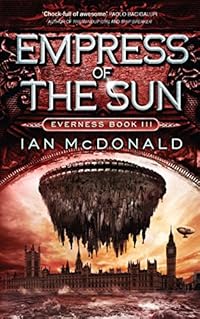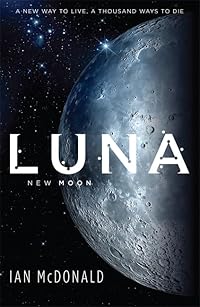Time Was by Ian McDonald
Posted in Science Fiction, Ian McDonald, Reading Reviewed at 12:00 on 26 September 2018
Tor, 2018, 138 p.

McDonald has always been a stylist. There has tended, though, to be a pyrotechnic quality to his poetically inclined prose, plus a certain knowingness. Knowingness isn’t entirely absent here, a pitch perfect novella in some contrast to his most recent Luna series (which tends to emphasise violence and power manœuvrings rather than relationships,) but it is always ruthlessly subordinated to the tale he is telling. Here the pyrotechnics have been reined in and the author shows an admirable restraint, total control. Everything is at the service of the story. Though there is still room for his sly allusions, I doubt there’s a spare word in its 138 pages. Before the inevitable deployment of the Science Fictional concepts underpinning the novella, the language used stands in comparison to that of anyone who has ever written fiction, the emotions conjured as poignant. My only caveat is that since it was published in the US it contains USianisms (‘ass’ for ‘arse’, ‘Dumpster’, ‘soccer’, ‘tires’ etc) and for a British reader the first two in particular immediately lift him or her straight out of the narrative. However, this is still the best piece of fiction I have read this year – and possibly for a long time beyond.
It is narrated mainly by Emmett Leigh, a bibliophile and bookseller who finds an odd book in the cast-offs of a bookshop which has gone out of business, inside which is enclosed a letter from one World War 2 soldier to another. A love letter. Other passages are extracts from a memoir by one of the two soldiers of his time in Shingle Street, engaged in a very hush-hush World War 2 project on the English coast.
Intrigued by both the book, Time Was – “A singular book,” which has “no author biography, no foreword, no afterword, no index or notes. No publisher’s address, no publication date. No clue to author,” – and the letter, Emmett sets about finding out more about the pair. This brings him into contact with Thorn Hildreth (who is twice greeted by the phrase, ‘Thorn thirtieth letter of the Icelandic alphabet,’ – I will merely note it is also, like yogh, a former letter in English both now defunct -) whose grandfather’s papers contained a photograph of the soldiers. Emmett contacts Shahrzad, a Persian émigré with the ability to recall not only faces but also where it was she first saw them. She identifies the pair of soldiers, Seligman and Chappell, in photographs taken in Gallipoli in 1915, and Goritsa in the war of the break-up of Yugoslavia. Pictures of Seligman and Chappell are also traced as far back as the Crimean War. By application of the normal distribution curve, Emmett eventually reasons Seligman and Chappell are time travellers, venturing up and down the ages with only the book Time Was – that in Emmet’s time exists solely in the inventories of five bookshops with strict instructions as to its disposal – to enable them to contact each other. Via the extracts we also find the Shingle Street project entailed “The Uncertainty Squad” using quantum superposition in order to achieve displacement of the location of a ship but instead conjured displacement in time.
A hint of McDonald’s background comes with the phrase, “Pagans are worse than Protestants for denominationalism.” We also have the observation, “Emotions have no definition other than themselves….. All written art is an attempt to communicate what it is to feel,” and a comment on the novelist’s and poet’s bane, “the irreducibility of feeling, it can’t be broken down into anything simpler or more explicable.”
While the SF idea In McDonald’s Time Was isn’t quite as outré as in Robert Heinlein’s All You Zombies (the father and mother of all time travel stories) it’s up there with that same author’s By His Bootstraps and, in contrast, a thousand times better written than either.
Pedant’s corner:- thatfirst (is two words, not one,) a new paragraph that was unindented, hadhoped (again, two words.) “‘A hot wind blew in our aces’” (faces,) “ ‘”Not abductees. Immortals.”’ ” (that first double inverted comma in the quote ought to be a start quote mark not an end one,) a missing start quote mark, at “ Mea culpa””, “any simpler: (anything simpler.) “He hops up behind he” (behind me,) “soe time” (some time,) “dedicated to a pastry-cooking” (why the “a”?) “‘I sold this copy one of your bookfinders’” (copy to one of your,) “a new tray or drinks” (of drinks,) “strung out along for half a mile along the street” (has one “along” too many.) “His glee is evident as he cast around” (casts around.) “He beckons me out to the where the bikes” (to where the bikes,) drafhty (draughty,) an extraneous single inverted comma at “ “East Suffolk”’ ” and again at “ ‘I look around’’ ” , the start quote mark for a piece of direct speech given at the end of the previous line (x 2,) withany (again, two words,) “I could be certain that that I lived with Thorn” (only one “that”,) “from the across the shop” (from across the shop.) “I would always been that Englishman” (always have been, or, always be.)







